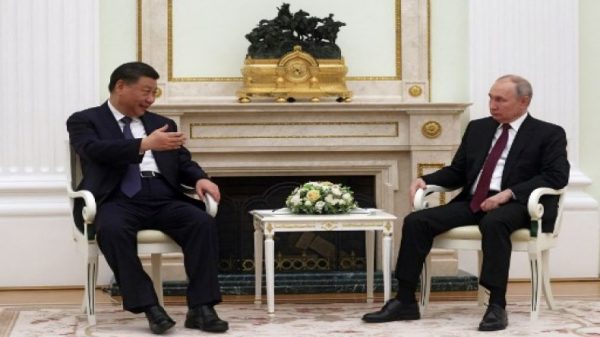Ukraine conflict to dominate talks between Putin and Xi

- Update Time : Tuesday, March 21, 2023
- 56 Time View

Vladimir Putin and Xi Jinping were set to hold a second day of talks on Tuesday, as the internationally isolated Russian leader said that he was open to discussing China’s proposals on the fighting in Ukraine.
Xi’s three-day visit to Moscow is a major coup for Putin — and comes days after a war crimes tribunal in The Hague issued a warrant for the Russian president’s arrest over accusations of unlawfully deporting Ukrainian children.
On Monday, Putin and Xi held four and a half hours of talks, calling each other ‘dear friend.’
In a rare move, Putin escorted Xi to his car after the talks, and the two were seen smiling together.
During the meeting, the Russian leader said he was open for talks on Ukraine and praised Beijing’s 12-point position paper on the conflict, which includes a call for dialogue and respect for all countries’ territorial sovereignty.
China has sought to portray itself as a neutral party, but Washington has warned the world should not be misled by Beijing’s moves, which could be a ‘stalling tactic’ to help Moscow.
US Secretary of State Antony Blinken said that the Chinese leader’s Moscow visit ‘suggests that China feels no responsibility to hold the president accountable for the atrocities committed to Ukraine.’
‘And instead of even condemning, it would rather provide diplomatic cover for Russia to continue to commit those great crimes,’ he added.
Xi told Putin Monday that China is ready to ‘continue to play a constructive role in promoting the political settlement’ of the Ukraine crisis, according to official Chinese agency Xinhua.
The United States has also accused Beijing of mulling arms exports to Moscow, claims China has denied.
Ukrainian President Volodymyr Zelensky has said he would welcome talks with Xi, although it was unclear Monday if the Chinese leader planned to speak to him after his visit to Moscow.
Kyiv on Monday said it expected Xi to use Beijing’s influence to push for an end to Moscow’s offensive in Ukraine and was ‘closely’ following the visit.
Once bitter foes during the Cold War, Moscow and Beijing have over the past years ramped up cooperation as both are driven by a desire to counterbalance US global dominance.
Beijing’s stance on Ukraine has drawn criticism from Western nations, which say China is tacitly supporting Moscow’s armed intervention.
During their talks on Monday, the Russian leader said the two countries had ‘plenty of common objectives and tasks’, while Xi hailed ‘close ties.’
Putin praised China’s ‘tremendous leap forward in its development’ of recent years, adding ‘we even envy you a little.’
Xi in turn said Russia had prospered under the 70-year-old Putin’s ‘strong leadership’, adding that he was certain that Russians will ‘strongly support you in your good undertakings’ and vote for him again next year.
Putin, who has been in power since 2000, has not said publicly if he plans to run for president again.
Citing Chinese philosopher Confucius, Putin wrote in the ruling Communist Party’s newspaper ahead of Xi’s visit: ‘Isn’t it a joy when a friend comes from afar!’
Analysts say Xi’s mediation efforts are unlikely to yield a cessation of hostilities in Ukraine, but his trip is closely watched in Western capitals.
A day before Xi’s arrival, the Kremlin said that Putin had visited the Russian-held Ukrainian city of Mariupol — his first visit to territory captured from Kyiv since the start of the assault.
Beijing has lambasted what it sees as a US-led pressure campaign against Russia as Moscow’s offensive in Ukraine drags on, instead calling for what it calls ‘impartial’ mediation of the conflict.
Western countries have argued that China’s proposals are heavy on grand principles but light on practical solutions.
The United States last week said China’s proposals would simply consolidate ‘Russian conquest’ and allow the Kremlin to prepare a fresh offensive.
‘We don’t support calls for a ceasefire right now,’ White House national security spokesman John Kirby said on Friday.
China and Russia have often worked in lockstep at the UN Security Council, using their veto power as permanent council members to counter the West.
And China said Monday that the International Criminal Court should avoid what it called ‘politicisation and double standards’, and respect the principle of immunity for heads of state.
Russia’s assault on Ukraine has also deepened fears among Western powers that China could one day try to take control of the self-ruled island of Taiwan, which Beijing sees as part of its territory.















